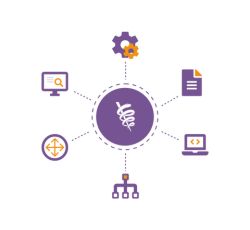Patient Registration
Patient registration is the first and the most important when a person steps into a hospital, clinic, or any medical facility. In this process, the personal information, medical history, and other insurance details about the patient are collected before actual treatment is performed. This makes sure that a hospital or a clinic has complete information to be able to deliver proper treatment while billing the concerned insurance company for the same.
Proper registration of patients is essential in the avoidance of mistakes, minimization of waiting time, and provision of care without unnecessary delay. It also aids in medical billing, where it ensures timely payments to healthcare providers and easy claims processing from the insurance side.
Importance of Patient Registration
Smooth Claim Processing
Correct patient information is vital for the settlement of claims through insurance companies. Incomplete patient registration leads to delayed processing, and the lag impacts the speed of payments into the accounts of healthcare providers. Proper collection of all the information required and accuracy in filling that information from the word go will provide smoother and swifter claim handling.
Fewer Claim Denials
Incorrect or incomplete patient information leads to claim denial cases from insurance companies, thus resulting in financial losses for healthcare providers. The time taken and amount of resources required for denied claims are more. Moreover, denied claims may not be fully reimbursed at times. In this way, healthcare providers avoid the possibility of claim denial with accurate data provided at initial levels. Health care provider's cash flow remains steady.
Enhanced Patient Care
The registration process directly impacts the overall experience. An organized and efficient registration system helps reduce waiting times and ensures that patients receive timely care. In contrast, a disorganized process can cause frustration and lead to delays in treatment, which negatively affects patient satisfaction.
Regulatory Compliance
The regulations that these organizations have to be in conformation with, one of which includes the HIPAA, concerning protection and confidentiality towards patient privacy. Efficient registration of patients provides the accurate documentation of law so that this compliance is never hampered and that the regulatory standards are also fulfilled.
_11zon (1).png_1743079235.png)
Advantages of Efficient Patient Registration
Accurate Invoicing and Claims Management
Accurate information at the registration stage reduces the risk of billing errors and incorrect claim submissions. This reduces rejections or delays in payment, and healthcare providers are paid on time. A well-organized system helps healthcare facilities avoid the financial strain that comes with billing errors.
Better Patient Care
Correct documentation of a patient's medical histories and personal data helps in serving them to perfection. All facts can then enable doctors to develop the proper drug plan or execute the appropriate actions for their medication. More appropriate diagnoses would therefore be rendered from the comprehensive documents.
Streamline Workflow
The paperwork burden would be reduced to the minimum when a streamlined process of registration occurs. When paper-based work processes are digitized, administrative activities can be made fast and reduce the time needed for manually putting data into patients' files.
Improved Communication
A well-organized patient registration system enables effective communication between the patient, the healthcare provider, and the insurance company. Accurate, clear, and complete information about the patient will ensure that all parties involved have the information needed, which decreases the chances of miscommunication and delays in billing and insurance coverage.
Financial Security for Healthcare Providers
Timely and accurate claim submissions are critical for the financial health of healthcare facilities. An effective registration system will help avoid delays or claim denials, which negatively impact a healthcare provider's cash flow.
Best Practices for Effective Patient Registration
Use Digital Solutions
Such tools as Electronic Health Records (EHR) may also help reduce paperwork and ensure that the patient's information is updated very accurately. Online patient registration forms and automated insurance verification tools speed up the process with less human error.
Staff needs regular training
The front desk needs regular training so that employees are updated regarding the registration process. Data collection techniques, insurance verification procedures, and the process of compliance with privacy regulations should be covered by all employees, including those handling the front desk. Verify Information Twice
It is important to cross-check patient information during the registration process. Simple mistakes in personal details, insurance coverage, or medical history may lead to severe consequences in billing and treatment. Data cross-referencing and verification ensure accuracy and prevent errors that may delay treatment or payment.
Maintain Data Security
Patient information is very sensitive; therefore, storing it in a secure manner is of utmost importance. Healthcare providers are required to follow HIPAA rules and regulations and take measures to protect patient data. This includes using encrypted systems and secure access protocols to prevent unauthorized access to patient records.
Clearly instruct patients
Patients will improve the registration process if they are informed beforehand of what the visit will require. Issuing explicit guidance on documents expected to be present on the visit date, like ID, card insurance, and any existing medical history ensures that one has no unnecessary wait time within the registration stage.
Services Provided by Meru Accounting for Patient Registration
Data entry and verification
We ensure that all patient demographics and insurance details are correctly documented at the onset. This helps to minimize errors and ensures that all the information is in place for smooth billing and claims processing. Proper data entry prevents delays and mistakes down the line.
Insurance Eligibility Checks
We check a patient's insurance coverage before his or her visit. This step helps avoid surprises in treatment or billing. Confirmation of insurance eligibility prior to a visit helps the healthcare provider avoid billing issues and delays in receiving payments from insurance companies.
Digital Registration Solutions
We introduce electronic patient registration forms and automatic workflows that streamline the whole process and make it faster and more efficient. It minimizes the amount of paperwork and secures all the data in an easy and accessible place, which will also speed up the administrative process.
HIPAA Compliance Support
We help ensure that all patient data is handled securely and complies with HIPAA regulations. Protecting patient information is critical, and we use encrypted systems to safeguard sensitive data, ensuring it remains private and secure at all times.
Customized Reporting and Analytics
We provide tailor-made reports and data analytics for healthcare providers in order to track the improvement that can be achieved in their patient registration process. Analyzing trends in data allows us to optimize registration workflows to enhance efficiency and make the entire system more effective.
Denial Prevention Strategies
We identify common registration errors that often cause claims to be denied. Anticipating such issues helps in reducing the chance of claims rejections, so healthcare providers maintain a steady revenue cycle without unwarranted interruption.
Conclusion
A smooth and accurate patient registration process is a prerequisite for effective healthcare management and medical billing. This would not only ensure that claims go through the insurance process without issues but also help improve the patient experience. Meru Accounting allows healthcare organizations to optimize the registration process with accuracy, compliance, and efficiency.
Our services make medical billing hassle-free, and our experts help healthcare facilities maintain financial stability. With the usage of digital solutions, verification of patient information, and compliance rules, unnecessary claims denials, and financial losses from healthcare providers would be avoided.
Our Bookkeeping And Writeup Process

Your Need
Search the Service You need

Enquiry
For enquiring make a call or mail us

Confirm
Get your Quote and confirm us

Stay Calm
Feel free and Relax Yourself

Effective budgeting and forecasting are crucial elements of strategic financial management, offering a structured pathway to business success.
Read MoreStarting a new business is exciting and it’s full of opportunities and challenges. At Meru Accounting, we understand the complexity involved and we provide comprehensive Business Start-Up ...
Read MoreCost control and reduction strategies are important elements of any organization's financial management structure. In the competitive marketplace, businesses must precisely manage their expe...
Read More
Due diligence services refer to a set of investigative procedures and assessments conducted by professionals, typically in accounting, finance, law, or consulting fields, to evaluate a business,...
Read More
Risk management is a crucial process employed by organizations to identify, assess, and prioritize potential risks that could hinder their objectives.
Read More
Business Process Optimization (BPO) is a strategic approach aimed at enhancing efficiency, reducing costs, and improving overall performance within organizations.
Read More
Financial restructuring is a strategic process that involves reorganizing a company’s financial framework to improve its stability and performance.
Read More
Although launching a business is an exciting endeavour, there are risks and difficulties associated with it. Effective financial management is essential to the success of every start-up, and it ...
Read More
Performance and improvement consulting is pivotal for businesses seeking to optimize operations and achieve sustainable growth.
Read More
Forensic accounting is a specialized area of accounting that involves investigation of financial records to detect fraud, theft, or other financial crimes.
Read More
Software implementation is a vital phase in the lifecycle of any software application. It involves a series of steps designed to ensure that the software is correctly installed and configured to...
Read More
Project accounting is a specialized branch of accounting that focuses on tracking and managing the financial aspects of a specific project throughout its lifecycle.
Read More
In the modern business environment, companies are increasingly recognizing the importance of nurturing not just the professional growth but also the financial well-being of their employees.
Read More
Handling accounts payable is an essential part of managing a business’s finances. It involves tracking and paying invoices, maintaining good vendor relationships, and ensuring cash flow re...
Read More
Medical billing plays a very central role in the healthcare area.
Read More
Patient registration is the first and the most important when a person steps into a hospital, clinic, or any medical facility.
Read More
Insurance verification is among the most integral steps in medical billing. Before providing even a single health service,
Read More
Medical coding refers to the procedure of converting diagnoses, procedures, medical service, and other forms of medical equipment into...
Read More
Claim submission is one of the key processes in health care because this ensures that service providers get remunerated on time.
Read More
Payment posting would be one of the most significant steps in any medical billing cycle so that healthcare providers will get paid for...
Read More
Denial management is one of the important processes in medical billing because it makes sure that the providers of health services...
Read More
Reporting and analytics are crucial parts of medical billing. They will help healthcare providers follow up on the financial performan...
Read More

